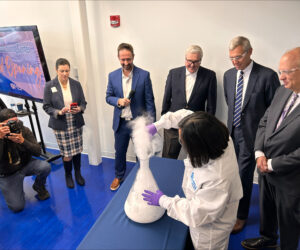Election Day is right around the corner, on Tues., November 6 and, in fact, early voting has already begun.
Question 1, a ballot measure to create government-mandated nurse staffing ratios in hospitals across the Commonwealth, could have serious negative repercussions for patients and businesses.
To help our members better understand the question, the Chamber has outlined the potential repercussions below and urges you to vote No on 1.
Cost of more than $1 billion per year.
The Health Policy Commission (HPC), the independent state agency charged with implementing Question 1 if it is adopted, issued a report estimating costs of up to $949 million every year, not including emergency room costs. READ THE REPORT [https://www.mass.gov/doc/presentation-analysis-of-potential-cost-impact-of-mandated-nurse-to-patient-staffing-ratios] At its Health Care Cost Trends hearing last week, the HPC estimated that ER costs could add up to another $110 million, bringing total annual costs over $1 billion. Insurers have been clear about the impact this would have, with the Massachusetts Association of Health Plans stated that “this increase in spending will likely result in increased premiums for employers and consumers.”
Skyrocketing Emergency Room Wait Times
By law, emergency rooms would have to limit capacity when nurses are at their maximum patient limit. Hospitals are subject to fines of up to $25,000 per violation, meaning they cannot admit patients to the ER (or transfer from the ER to other units that are at capacity) if it would cause them, even temporarily, to go over the mandatory ratios.
Loss of 1,000 Behavioral Health Beds Statewide
The Massachusetts Association of Behavioral Health Systems estimates that Question 1 would result in the closure of 1,000 behavioral health beds across the state at a time when Massachusetts needs resources for behavioral health and addiction treatment more than ever. This would be concerning at any time, but it is particularly so in the midst of an ongoing opioid and substance use disorder crisis.
Secondary Impacts on Other Providers
Massachusetts currently has an estimated shortage of 1,200 registered nurses, yet hospitals will have to hire thousands of RNs within 37 business days in order to meet the ratios by January 1, 2019, when the law take would take effect. Because of the shortage, hospitals would have to take them from other vital providers – community health centers, outpatient behavioral providers, nursing homes, visiting nurse providers, etc., impacting patients served by these institutions. For this reason, Question 1 is opposed by organizations such as the Mass League of Community Health Centers, VNA, Mass Senior Care Association, Brain Injury Association, Home Care Alliance and Hospice, and Palliative Care Federation, just to name a few.
Service Cuts and Bed Closures
The inability to hire sufficient RNs due to the nursing shortage will result in bed closures and service cuts to meet the mandatory ratios. Likewise, added costs will cause many hospitals – especially safety net providers – to cut services and programs to balance the budget and stay afloat.
Advocates for Question 1 claim it is designed to improve patient safety. Yet, Massachusetts already ranks ahead of California – the only state with mandatory nurse staffing ratios – in nearly every measure of patient safety, including 5 out of 6 nurse-related measures included in the Health Policy Commission study. In fact, the HPC report stated “there was no systematic improvement in patient outcomes” in California since implementation of mandatory ratios in 2004.





